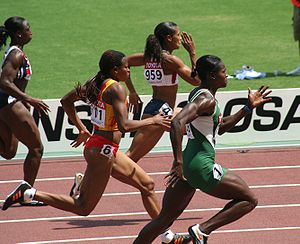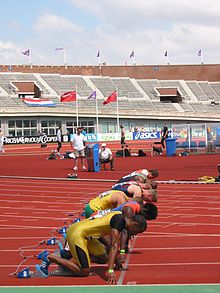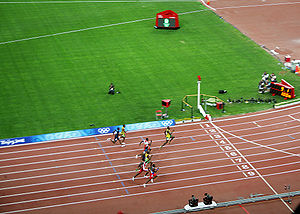- 100 metres
-
This article is about the 100 metres race. For lengths on the order of magnitude of 100 metres, see 1 hectometre.
The 100 metres, or 100-metre dash, is a sprint race in track and field competitions. The shortest common outdoor running distance, it is one of the most popular and prestigious events in the sport of athletics. It has been contested at the Summer Olympics since 1896 (1928 for women). The reigning 100 m Olympic champion is often named "the fastest man/woman in the world".
On an outdoor 400 metres running track, the 100 m is run on the home straight, with the start sometimes being set on an extension to make it a straight-line race. Runners begin in the starting blocks and the race begins when an official fires the starter's pistol. Sprinters typically reach top speed after somewhere between 50–60 m. Their speed then slows progressively towards the finish line.
The 10-second barrier has historically been a barometer of fast men's performances, while the best female sprinters take eleven seconds or less to complete the race. The current men's world record is 9.58 seconds, set by Jamaica's Usain Bolt, while American Florence Griffith-Joyner holds the women's world record of 10.49 seconds.
The 100 m emerged from the metrication of the 100 yards (91.4 m), a now defunct distance originally contested in English-speaking countries. The event is largely held outdoors as few indoor facilities have a 100 m straight.
Contents
Race dynamics
 Runners lining up to start the race in Osaka
Runners lining up to start the race in Osaka
Start
At the start, some athletes play psychological games such as trying to be last to the starting blocks, although direct intimidation would be considered unsportsmanlike.
The time between the gun and first kick against the starting block is measured electronically, via sensors built in the gun and the blocks. A reaction time less than 0.1 s is considered a false start. The 0.1-second interval accounts for the sum of the time it takes for the sound of the starter's pistol to reach the runners' ears, and the time it takes to react to it.
For many years a sprinter was disqualified if responsible for two false starts individually. However, this rule allowed some major races to be restarted so many times that the sprinters started to lose focus. The next iteration of the rule, introduced in February 2003, meant that one false start was allowed between the field, but anyone responsible for a subsequent false start was disqualified.
This rule led to some sprinters deliberately false-starting to gain a psychological advantage: an individual with a slower reaction time might false-start, forcing the faster starters to wait and be sure of hearing the gun for the subsequent start, thereby losing some of their advantage. To avoid such abuse and to improve spectator enjoyment, the IAAF implemented a further change in the 2010 season – a false starting athlete now receives immediate disqualification.[1] This proposal was met with objections when first raised in 2005, on the grounds that it would not leave any room for innocent mistakes. Justin Gatlin commented, "Just a flinch or a leg cramp could cost you a year's worth of work.".[2] The rule had a dramatic impact at the 2011 world championships, when current world record holder Usain Bolt was disqualified.[3][4]
Mid-race
Runners typically reach their top speed just past the halfway point of the race and they progressively decelerate in the latter stages of the race. Maintaining that top speed for as long as possible is a primary focus of training for the 100 m.[5] Pacing and running tactics do not play a significant role in the 100 m, as success in the event depends more on pure athletic qualities and technique.
Finish
The winner, by IAAF Competition Rules, is determined by the first athlete with his or her torso (not including limbs, head, or neck) over the nearer edge of the finish line.[6] When the placing of the athletes is not obvious, a photo finish is used to distinguish which runner was first to cross the line.
Climatic conditions
See also: wind assistance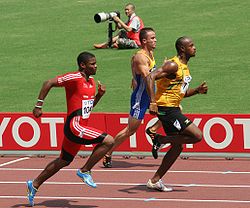 Previous world record holder Asafa Powell leading a race.
Previous world record holder Asafa Powell leading a race.
Climatic conditions, in particular air resistance, can affect performances in the 100 m. A strong head wind is very detrimental to performance, while a tail wind can improve performances significantly. For this reason, a maximum tail wind of 2.0 m/s is allowed for a 100 m performance to be considered eligible for records, or "wind legal".
Furthermore, sprint athletes perform better at high altitudes because of the thinner air, which provides less air resistance. In theory, the thinner air would also make breathing slightly more difficult (due to the partial pressure of oxygen being lower), but this difference is negligible for sprint distances where all the oxygen needed for the short dash is already in the muscles and bloodstream when the race starts. While there are no limitations on altitude, performances made at altitudes greater than 1000 m above sea level are marked with an "A".[7]
Record performances
Major 100 m races, such as at the Olympic Games, attract much attention, particularly when the world record is thought to be within reach.
The men's world record has been improved upon twelve times since the introduction of electronic timing in 1968.[8] The current men's world record of 9.58 s is held by Usain Bolt of Jamaica, set at the 2009 World Athletics Championships final on 16 August 2009, breaking his own previous world record by 0.11 s.[9] The current women's world record of 10.49 s was set by Florence Griffith-Joyner of the USA, in Indianapolis, Indiana, on 16 July 1988.[10]
Illegal drug use has been seen by some people as a means to gain a competitive edge - in particular, the scandal at the 1988 Summer Olympics when the winner Ben Johnson was stripped of his medal.
Jim Hines was the first man to break the 10-second barrier in the 100 m, recording the first sub-10 second, electronically timed run to win the 100 metres at the 1968 Olympics.
Fastest 100 metres runners
Men
See also: 10-second barrierUpdated 8 September 2011[11]
Rank Fastest time Wind (m/s) Athlete Country Date Location 1 9.58 +0.9 Usain Bolt  Jamaica
Jamaica16 August 2009 Berlin 2 9.69 +2.0 Tyson Gay  United States
United States20 September 2009 Shanghai 3 9.72 +0.2 Asafa Powell  Jamaica
Jamaica2 September 2008 Lausanne 4 9.78 +0.9 Nesta Carter  Jamaica
Jamaica29 August 2010 Rieti 5 9.79 +0.1 Maurice Greene  United States
United States16 June 1999 Athens 6 9.80 +1.3 Steve Mullings  Jamaica
Jamaica4 June 2011 Eugene 7 9.82 +0.0 Yohan Blake  Jamaica
Jamaica8 September 2011 Zurich 8 9.84 +0.7 Donovan Bailey  Canada
Canada27 July 1996 Atlanta +0.2 Bruny Surin  Canada
Canada22 August 1999 Seville 10 9.85 +1.2 Leroy Burrell  United States
United States6 July 1994 Lausanne +0.6 Justin Gatlin  United States
United States22 August 2004 Athens +1.7 Olusoji Fasuba  Nigeria
Nigeria12 May 2006 Doha +1.3 Mike Rodgers  United States
United States4 June 2011 Eugene +1.0 Richard Thompson  Trinidad and Tobago
Trinidad and Tobago13 August 2011 Port of Spain Notes
- Tyson Gay also has a time of 9.68 s set on 29 June 2008 during the 2008 U.S. Olympic Track & Field Trials at Hayward Field in Eugene, Oregon; the tail wind speed was 4.1 m/s, more than double the IAAF legal limit.[12]
- Obadele Thompson ran a wind-aided 9.69 in El Paso, Texas in April 1996 which stood as the fastest ever 100m time for 12 years until Tyson Gay's June 2008 performance; the tail wind speed was 5.7 m/s.
- Justin Gatlin ran 9.77 in Doha on 12 May 2006, which was at the time ratified as a world record. However, the performance was rescinded in 2007 after he failed a doping test in April 2006.
- Carl Lewis ran a time of 9.78 seconds at the 1988 US Olympic trials in Indianapolis, but it was wind aided (the tail wind speed was 5.2 m/s).
- Tim Montgomery's time of 9.78 at Paris on 14 September 2002 was rescinded following his indictment in the BALCO scandal on drug use and drug trafficking charges. The time had stood as the world record until Asafa Powell first ran 9.77.
- Ben Johnson ran 9.79 at Seoul on 24 September 1988, but he was disqualified after he tested positive for stanozolol after the race. He subsequently admitted to drug use between 1981 and 1988, and his time of 9.83 at Rome on 30 August 1987 was rescinded. Carl Lewis's 9.92 in the Seoul race was therefore recognized as the world record, and his two prior runs of 9.93 were seen as having equalled the previous world record.
Women
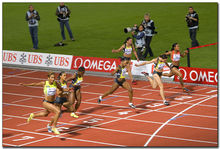 Christine Arron (left) wins the 100 m at the Weltklasse meeting.
Christine Arron (left) wins the 100 m at the Weltklasse meeting.
Updated 31 May 2011
Rank Fastest time Wind (m/s) Athlete Nation Date Location 1 10.49 0.0 Florence Griffith-Joyner  United States
United States16 July 1988 Indianapolis 2 10.64 +1.2 Carmelita Jeter  United States
United States20 September 2009 Shanghai 3 10.65 [A] +1.1 Marion Jones  United States
United States12 September 1998 Johannesburg 4 10.73 +0.1 Shelly-Ann Fraser  Jamaica
Jamaica17 August 2009 Berlin +2.0 Christine Arron  France
France19 August 1998 Budapest 6 10.74 +1.3 Merlene Ottey  Jamaica
Jamaica7 September 1996 Milan 7 10.75 +0.4 Kerron Stewart  Jamaica
Jamaica10 July 2009 Rome 8 10.76 +1.7 Evelyn Ashford  United States
United States22 August 1984 Zürich +1.1 Veronica Campbell-Brown  Jamaica
Jamaica31 May 2011 Ostrava 10 10.77 +0.9 Irina Privalova  Russia
Russia6 July 1994 Lausanne +0.7 Ivet Lalova  Bulgaria
Bulgaria19 June 2004 Plovdiv Notes
- Florence Griffith-Joyner's World Record has been the subject of a controversy due to strong suspicion of a defective anemometer measuring a tailwind lower than actually present; since 1997 the International Athletics Annual of the Association of Track and Field Statisticians has listed this performance as "probably strongly wind assisted, but recognized as a world record".[13]
Area records
Updated 6 September 2011.[14]
Area Men's Women's Time Athlete Nation Time Athlete Nation Africa (records) 9.85 Olusoji Fasuba  Nigeria
Nigeria10.90 Glory Alozie  Nigeria
NigeriaAsia (records) 9.99 Samuel Francis  Qatar
Qatar10.79 Li Xuemei  China
ChinaEurope (records) 9.86 Francis Obikwelu  Portugal
Portugal10.73 Christine Arron  France
FranceNorth, Central America
and Caribbean (records)9.58 WR Usain Bolt  Jamaica
Jamaica10.49 WR Florence Griffith-Joyner  United States
United StatesOceania (records) 9.93 Patrick Johnson  Australia
Australia11.12[A] Melinda Gainsford-Taylor  Australia
AustraliaSouth America (records) 10.00[A] Robson da Silva  Brazil
Brazil11.15 Ana Cláudia Silva  Brazil
BrazilNotes
- A Represents a time set at a high altitude.[15]
- WR World Record
World Championship medalists
Men
Championships Gold Silver Bronze 1983 Helsinki  Carl Lewis (USA)
Carl Lewis (USA) Calvin Smith (USA)
Calvin Smith (USA) Emmit King (USA)
Emmit King (USA)1987 Rome  Carl Lewis (USA)
Carl Lewis (USA) Raymond Stewart (JAM)
Raymond Stewart (JAM) Linford Christie (GBR)
Linford Christie (GBR)1991 Tokyo  Carl Lewis (USA)
Carl Lewis (USA) Leroy Burrell (USA)
Leroy Burrell (USA) Dennis Mitchell (USA)
Dennis Mitchell (USA)1993 Stuttgart  Linford Christie (GBR)
Linford Christie (GBR) Andre Cason (USA)
Andre Cason (USA) Dennis Mitchell (USA)
Dennis Mitchell (USA)1995 Gothenburg  Donovan Bailey (CAN)
Donovan Bailey (CAN) Bruny Surin (CAN)
Bruny Surin (CAN) Ato Boldon (TRI)
Ato Boldon (TRI)1997 Athens  Maurice Greene (USA)
Maurice Greene (USA) Donovan Bailey (CAN)
Donovan Bailey (CAN) Tim Montgomery (USA)
Tim Montgomery (USA)1999 Seville  Maurice Greene (USA)
Maurice Greene (USA) Bruny Surin (CAN)
Bruny Surin (CAN) Dwain Chambers (GBR)
Dwain Chambers (GBR)2001 Edmonton  Maurice Greene (USA)
Maurice Greene (USA) Bernard Williams (USA)
Bernard Williams (USA) Ato Boldon (TRI)
Ato Boldon (TRI)2003 Paris  Kim Collins (SKN)
Kim Collins (SKN) Darrel Brown (TRI)
Darrel Brown (TRI) Darren Campbell (GBR)
Darren Campbell (GBR)2005 Helsinki  Justin Gatlin (USA)
Justin Gatlin (USA) Michael Frater (JAM)
Michael Frater (JAM) Kim Collins (SKN)
Kim Collins (SKN)2007 Osaka  Tyson Gay (USA)
Tyson Gay (USA) Derrick Atkins (BAH)
Derrick Atkins (BAH) Asafa Powell (JAM)
Asafa Powell (JAM)2009 Berlin  Usain Bolt (JAM)
Usain Bolt (JAM) Tyson Gay (USA)
Tyson Gay (USA) Asafa Powell (JAM)
Asafa Powell (JAM)2011 Daegu  Yohan Blake (JAM)
Yohan Blake (JAM) Walter Dix (USA)
Walter Dix (USA) Kim Collins (SKN)
Kim Collins (SKN)Women
See also
- 100-yard dash
- National champions 100 metres (men)
- World record progression 100 metres men
- World record progression 100 metres women
References
- ^ "IAAF keeps one false-start rule". BBC. 3 August 2005. http://news.bbc.co.uk/sport2/hi/athletics/4433815.stm. Retrieved 15 August 2008.
- ^ "Gatlin queries false start change". BBC News. 6 May 2005. http://news.bbc.co.uk/sport2/hi/athletics/4521963.stm. Retrieved 15 August 2008.
- ^ Christopher Clarey (28 August 2011). "Who Can Beat Bolt in the 100? Himself". The New York Times. http://www.nytimes.com/2011/08/29/sports/bolt-is-disqualified-in-100-at-worlds-blake-wins.html. Retrieved 28 August 2011.
- ^ "The disqualification of Usain Bolt". IAAF. 28 August 2011. http://daegu2011.iaaf.org//newslistdetail.aspx?id=61468. Retrieved 28 August 2011.
- ^ http://speedendurance.com/2008/08/22/usain-bolt-100m-10-meter-splits-and-speed-endurance/
- ^ Sandre-Tom. "IAAF Competition Rules 2009, Rule 164". IAAF. Archived from the original on 3 September 2009. http://www.goldenleague.net/mm/Document/Competitions/TechnicalArea/04/95/59/20090303014358_httppostedfile_CompetitionRules2009_printed_8986.pdf. Retrieved 23 August 2009.
- ^ 100 metres IAAF
- ^ Press, Associated. "Progression of 100 meters world record". ESPN. http://sports.espn.go.com/oly/news/story?id=2442751. Retrieved 28 June 2011.
- ^ "100 Metres Results". IAAF. 16 August 2009. http://berlin.iaaf.org/documents/pdf/3658/AT-100-M-f--1--.RS1.pdf. Retrieved 31 May 2011.
- ^ 100 Metres All Time. IAAF (9 March 2009). Retrieved on 6 May 2009. Archived 2009-05-08.
- ^ "Top List – 100m". IAAF. http://www.iaaf.org/statistics/toplists/inout=o/age=n/season=0/sex=M/all=y/legal=A/disc=100/detail.html. Retrieved 31 May 2011.
- ^ Zinser, Lynn (30 June 2008), "Shattering Limits on the Track, and in the Pool" The New York Times
- ^ Linthorne, Nick (March 2003). "Wind Assistance". Brunel University. Archived from the original on 3 September 2009. http://people.brunel.ac.uk/~spstnpl/BiomechanicsAthletics/WindAssistance.htm. Retrieved 25 August 2008.
- ^ 100 metres records. IAAF (6 September 2011). Retrieved on 2011-06-09. Archived 6 September 2011.
- ^ 60 Metres Records. IAAF (4 April 2009). Retrieved on 2009-04-04.
External links
Events in the sport of athletics Track Sprints Hurdles 50 m · 55 m · 60 m · 100 m · 110 m · 400 mMiddle distance Long distance Relays 4 × 100 m · 4 × 200 m · 4 × 400 m · 4 × 800 m · 4 × 1500 m · Distance medley relay · Sprint medley relay · Swedish relayField Throws Jumps Combined Road Running Walking 10 km · 20 km · 50 kmCategories:- 100 metres
- Events in athletics (track and field)
- Sprint running
Wikimedia Foundation. 2010.

